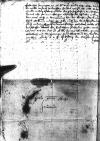Kegenwertiger czeiger, der erbar Christoph von Wantgau (Krzysztof Wątkowski) ⌊Cristof WantkoufskyChristoph von Wantgau (Krzysztof Wątkowski) ⌋, unser underthann, / hat uns undertheniglichenn czuvorsthen gebenn, / wie seiner mutter swester shonn, / der ein pfharher zur Leisau (Lisewo), village in northern Poland, 3 km E of Dirschau (Tczew), today Lisewo Malborskie⌊LeisowLeisau (Lisewo), village in northern Poland, 3 km E of Dirschau (Tczew), today Lisewo Malborskie⌋ im Grosem Werder gewesen, kurtzlich interstatus vorstorbenn sei, / und darneben angezeigt, das ehr mit seinem bruder die nehesten erbenn zu den vorlassenen gutternn werenn. Dieweil aber nu gedochter prister ane testament vorscheidenn, / und also die d[i]sposition seiner gutter an den hochwirdigenn in Got, unsernn freuntlichen, lieben brudernn, / hern Tiedemann Giese (Tidemannus Gisius) (*1480 – †1550), in 1519 ennobled by King Sigismund I; 1504-1538 Canon of Ermland (Warmia); 1516-1527, 1533-1537 Judicial Vicar and Vicar General of Ermland; 1523-1538 Custos of Ermland; 1537-1549 Bishop of Kulm (Chełmno); 1549-1550 Bishop of Ermland (BORAWSKA 1984, passim)⌊TidemannumTiedemann Giese (Tidemannus Gisius) (*1480 – †1550), in 1519 ennobled by King Sigismund I; 1504-1538 Canon of Ermland (Warmia); 1516-1527, 1533-1537 Judicial Vicar and Vicar General of Ermland; 1523-1538 Custos of Ermland; 1537-1549 Bishop of Kulm (Chełmno); 1549-1550 Bishop of Ermland (BORAWSKA 1984, passim)⌋, bischoffen zu Kulm (Chełmno, Culma, Culmen), town in northern Poland, on the Vistula river, 40 km N of Thorn (Toruń)⌊ColmensheKulm (Chełmno, Culma, Culmen), town in northern Poland, on the Vistula river, 40 km N of Thorn (Toruń)⌋, gekommen, / durch welchen auch dem officiali zu Marienburg (Malbork), town and castle in northern Poland, Pomeranian Voivodeship, on the Nogat river, a branch of the Vistula at its delta, the capital of the Grand Masters of the Teutonic Order in Prussia (1309-1457), a voivodeship capital in Royal Prussia, which belonged to the Kingdom of Poland (1466-1772). Marienburg (taking turns with Graudenz (Grudziądz)) was the venue for the Provincial Diets of Royal Prussia, which were chaired by the bishop of Ermland (Warmia)⌊MarienburgMarienburg (Malbork), town and castle in northern Poland, Pomeranian Voivodeship, on the Nogat river, a branch of the Vistula at its delta, the capital of the Grand Masters of the Teutonic Order in Prussia (1309-1457), a voivodeship capital in Royal Prussia, which belonged to the Kingdom of Poland (1466-1772). Marienburg (taking turns with Graudenz (Grudziądz)) was the venue for the Provincial Diets of Royal Prussia, which were chaired by the bishop of Ermland (Warmia)⌋ die aufzuteilenn bovelich geschenn, / und die vorlassenen schulde, so noch wegen des vorstorbenen einzumanen der erbnamen zugeeignet, / hat genanter Christoph von Wantgau (Krzysztof Wątkowski) ⌊WantkeufskyChristoph von Wantgau (Krzysztof Wątkowski) ⌋ uns ferner vormeldet, / wie das gedochter pfharher zur Leisau (Lisewo), village in northern Poland, 3 km E of Dirschau (Tczew), today Lisewo Malborskie⌊LeisowLeisau (Lisewo), village in northern Poland, 3 km E of Dirschau (Tczew), today Lisewo Malborskie⌋ etwan ein gut ader dorf, / bei Dirschau (Tczew), town in northern Poland, Pomerania, on the Vistula river, 5 km NW of Marienburg⌊DirsowDirschau (Tczew), town in northern Poland, Pomerania, on the Vistula river, 5 km NW of Marienburg⌋ gelegen, sol vor XIIII hundert marken ungefer vorkauft / , und von solchem gelde czwelfhundert marken zu trauer handt / bei dem vorstorbnem pfarher zu Dirsow abgelegt habenn, / von welchem gelde der pfarher viel hundert marken, wie Ewer Herlichkeit Wantkoufsky borichten wirdt, auch der pfarher von Dirsow im seinem letzsten bokant hat, hin und widder ausgeligenn das ... zu Dirsow sein. Dieweil den nu zu solchem gelde und schulden Christoph von Wantgau (Krzysztof Wątkowski) ⌊Christof WantkoufskyChristoph von Wantgau (Krzysztof Wątkowski) ⌋ mit seinem bruder die neheste[n] sein, / dassulbe auch ihnen als den erbnamen durch hochgedochten hern Tiedemann Giese (Tidemannus Gisius) (*1480 – †1550), in 1519 ennobled by King Sigismund I; 1504-1538 Canon of Ermland (Warmia); 1516-1527, 1533-1537 Judicial Vicar and Vicar General of Ermland; 1523-1538 Custos of Ermland; 1537-1549 Bishop of Kulm (Chełmno); 1549-1550 Bishop of Ermland (BORAWSKA 1984, passim)⌊bischofTiedemann Giese (Tidemannus Gisius) (*1480 – †1550), in 1519 ennobled by King Sigismund I; 1504-1538 Canon of Ermland (Warmia); 1516-1527, 1533-1537 Judicial Vicar and Vicar General of Ermland; 1523-1538 Custos of Ermland; 1537-1549 Bishop of Kulm (Chełmno); 1549-1550 Bishop of Ermland (BORAWSKA 1984, passim)⌋ zu Kulm (Chełmno, Culma, Culmen), town in northern Poland, on the Vistula river, 40 km N of Thorn (Toruń)⌊ColmensheKulm (Chełmno, Culma, Culmen), town in northern Poland, on the Vistula river, 40 km N of Thorn (Toruń)⌋ zueigenet, / und die ih[e]nigen, den solchs gelt geligenn, under Ewer Herlichkeit gesessenn, gelanget derwegen an Ewer Herlichkeit unser freuntliche bitte, / diesulbe wolte unserm underthan in dem, wozu ehr recht haben wirdt, nicht absthenn, / sunder im gunstiglichenn vorhelffenn, damit ehr ane langen aufczug die schulde / nebenn dem, was noch in vorwarung bei der kirchen zu Dirschau (Tczew), town in northern Poland, Pomerania, on the Vistula river, 5 km NW of Marienburg⌊DirsowDirschau (Tczew), town in northern Poland, Pomerania, on the Vistula river, 5 km NW of Marienburg⌋ liget, bokommen muge. / Wo ihm auch von hantschriften / ad[er] sunst anderen beweisen etzwas vorenthalten wurde, / wolte Ewer Herlichkeit vorschaffen, auf das in diesulbenn zuhanden geben werde[n]. Wo wir uns den das zu Ewer Herlichkeit, / die wir gotlichen genade[n] mit langweriger gesuntheit bovolen, / vorshen wollen.

